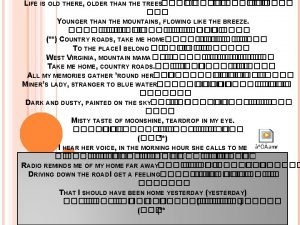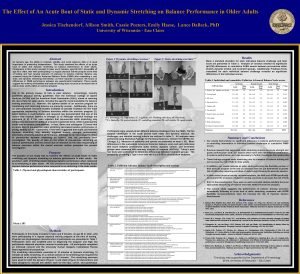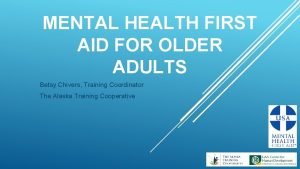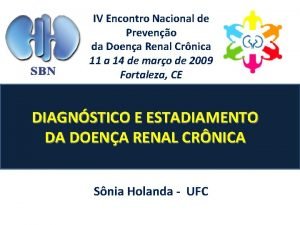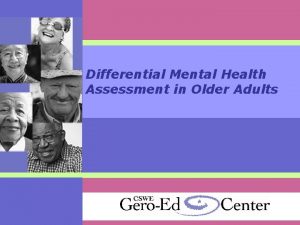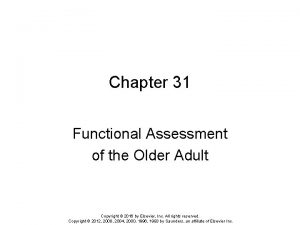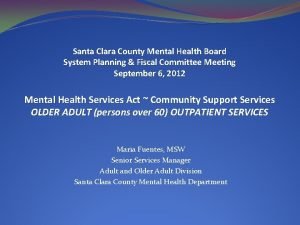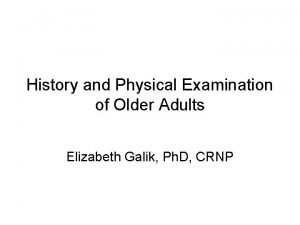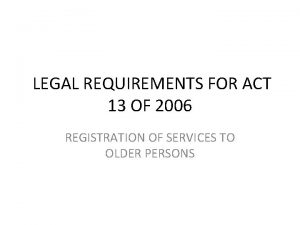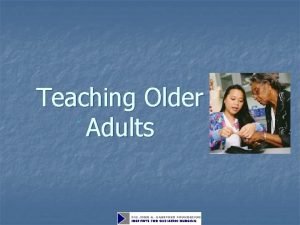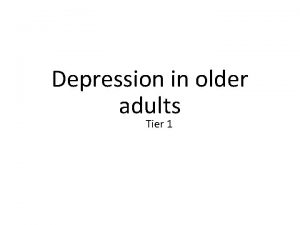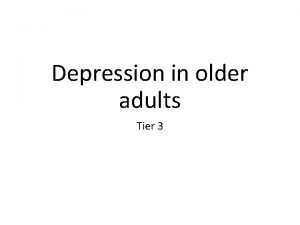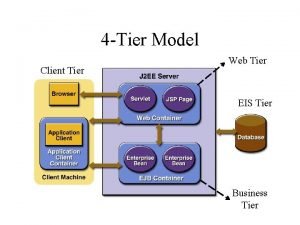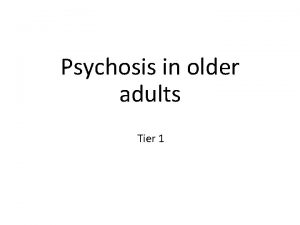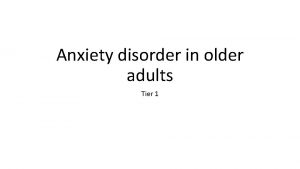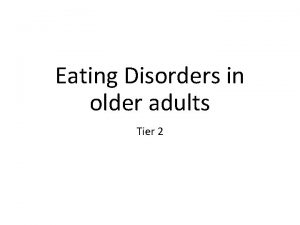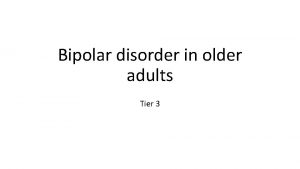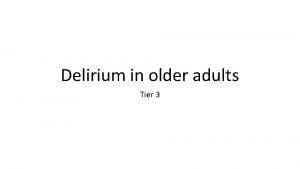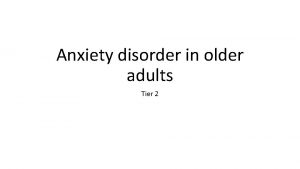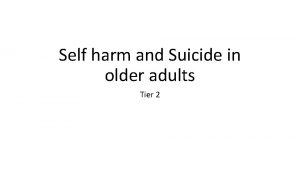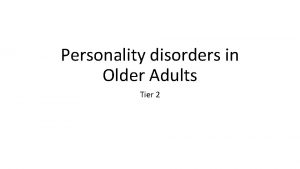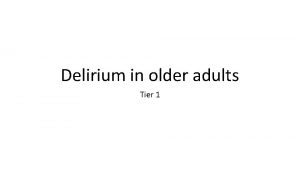Depression in older adults Tier 2 What is















- Slides: 15

Depression in older adults Tier 2

What is depression? A syndrome- a group of signs and symptoms that occur together and characterise depression. To confirm a diagnosis: • The symptoms must be on most days for at least two weeks causing significant social or functional impairment • It is NOT a normal experience = NOT inevitable with ageing – hence should not be ignored • Older adults are less likely to seek help for their mental health problems due to stigma.

• • • Signs and Symptoms of depression Depressed mood with negative thinking Disturbed sleep - Early Morning Wakening Lack of enjoyment and interest Reduced energy levels and lack of motivation Slowness of body and mind Self-esteem and self-confidence are almost always reduced Ideas of guilt or worthlessness are often present Reduced appetite and weight loss Loss of libido Thoughts of self harm and suicide

How is presentation different? Older adults may present differently to adults of working age • Mood is not invariably the most prominent symptom • Anxiety can instead be the prominent symptom of depression and can be a marker of severity of depression • Agitation and restlessness including inability to keep still, constant pacing, irritability • Personality changes • Preoccupation with physical symptoms like faintness or dizziness, pain, weakness, constipation, tiredness. • Unexplained functional decline (walking /incontinence) • Memory problems ( memory impairment-self-reported) • Minimisation or denial that they have depression

Risk factors for developing depression in older adults • Physical illness: pain, Parkinson’s, recent MI, strokes, TIAs, cancer • Loss of sight or hearing • Vascular and Lewy Body dementia • Alcohol and drug misuse • Bereavement • Being a carer • Loss of independence/home/ social network • Loneliness • Past history of deprivation / abuse in their youth • Past history of depression • Certain prescription medications

Why is depression missed ? Older person with depression Staff Older adults may not report low mood Staff may not consider the diagnosis and recognition is often low Older adults may not be able to express themselves Staff may believe that depression is justified/ normal Depression is expressed via bodily symptoms Staff may feel ill equipped to deal with the distress Older person may feel ashamed of feeling depressed Staff may be worried about drug side-effects Older adults may not use the term depression Staff may believe depression is untreatable

Risks associated with having depression in older adults are: • Increased mortality in older adults with depression especially from cardio vascular causes • Self-neglect • Neglect of other physical illnesses • Suicide • Increased risk of cognitive impairment/ dementia • Increased risk of institutionalisation

Assessment • History and clinical picture • Risk assessment around self neglect /self harm/suicidal thoughts • Collateral history • Rule out physical health , medication causes • Screening for depression using two questions • Assessment scales could be used… • Becks depression inventory • Geriatric Depression Scale • Hospital Anxiety and Depression Scale • Cornell Scale

Simple questions to screen for depression Two-question screening test • During the last month, have you often been bothered by feeling down, depressed or hopeless? • During the last month, have you often been bothered by having little interest or pleasure in doing things? Answering yes to either of these questions is considered a positive test result, warranting further assessment.

GDS – Geriatric Depression Scale Choose the best answer for how you have felt over the past week: • • • • 1. Are you basically satisfied with your life? YES / NO 2. Have you dropped many of your activities and interests? YES / NO 3. Do you feel that your life is empty? YES / NO 4. Do you often get bored? YES / NO 5. Are you in good spirits most of the time? YES / NO 6. Are you afraid that something bad is going to happen to you? YES / NO 7. Do you feel happy most of the time? YES / NO 8. Do you often feel helpless? YES / NO 9. Do you prefer to stay at home, rather than going out and doing new things? YES / NO 10. Do you feel you have more problems with memory than most? YES / NO 11. Do you think it is wonderful to be alive now? YES / NO 12. Do you feel pretty worthless the way you are now? YES / NO 13. Do you feel full of energy? YES / NO 14. Do you feel that your situation is hopeless? YES / NO 15. Do you think that most people are better off than you are? YES / NO Answers in bold indicate depression. Score 1 point for each bolded answer. A score > 5 points is suggestive of depression and warrants follow-up comprehensive assessment. A score > 10 points is almost always indicative of depression. 12/24/2021 10

Management • Investigate and treat any biological factors such as some particular illnesses or medication issues • Reduce any psychological factors such as difficulties with relationships • Reduce any social factors, such as isolation and lack of stimulation • Psychological therapies are effective so consider referral to IAPT • Medications can also help • Refer to Old Age Psychiatry if moderate to severe depression with no response to treatment

Treatment of depression • Antidepressants: SSRIs, SNRIs, Tricyclics, MAOI, (SSRIs most commonly used) • Remember antidepressants can be effective but also carry higher risk of side effects because of multiple medical comorbidities and drug-drug interactions in cases of polypharmacy. • Mood stabilisers such as Lithium • Psychological therapy such as Supportive psychotherapy, CBT, Interpersonal • ECT may be indicated for severe depression • Treating depression is worthwhile • Treatment response is usually good like younger adults

Prevention of depression • Address any physical health issues early • Identify sensory impairments and manage • Life story reviews - find time to sit and chat • Listen & share-Give genuine time, take an interest • Build therapeutic relationships • Encourage activities which are enjoyable • Encourage exercise if possible • Identify depressive symptoms early

Key points to aid detection • Think Depression-If you are aware of depression you will be less likely to miss it • Be aware of risk factors • Look for functional decline • Watch for significant symptoms • Ask directly about their mood Resources : Depression in Older People-animated video https: //www. youtube. com/watch? v=mrqga. Ln. Q 5 z. Q

Resources Depression in Older People-animated video https: //www. youtube. com/watch? v=mrqga. Ln. Q 5 z. Q • MPC_05_06 Where There’s Depression, There’s Hope | Where There’s Depression, There’s Hope (mindedforfamilies. org. uk) • This is an easy to access website for older adults and their families which has good advice about symptoms and treatment of depression in older adults
 Tier 1, 2 3 words examples
Tier 1, 2 3 words examples Tier three vocabulary
Tier three vocabulary Life is older than the trees
Life is older than the trees Dynamic stretching for older adults
Dynamic stretching for older adults Mental health and older adults
Mental health and older adults Older adults
Older adults Mental health and older adults
Mental health and older adults Covids older adults
Covids older adults Altered cognition in older adults is commonly attributed to
Altered cognition in older adults is commonly attributed to Older adults mental health
Older adults mental health Conclusion of physical examination
Conclusion of physical examination Sos spelling for older students
Sos spelling for older students Moses older sister
Moses older sister Downsizing and divesting older business
Downsizing and divesting older business Dq98 form
Dq98 form Synformal anticline
Synformal anticline


